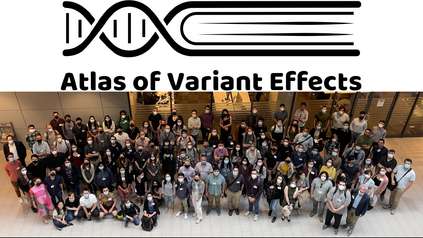Sanger scientists recognised by EMBO
Listen to “Sanger scientists recognised by EMBO” on Spreaker.
Today (9 July) Dr David Adams and Professor Mats Nilsson have been elected members of the European Molecular Biology Organisation (EMBO) for their outstanding achievements and significant contributions to the life sciences. In EMBO’s 60th anniversary year, they are among 120 new additions to the EMBO Membership, including 100 members and 20 associate members.
Dr Adams is a senior group leader in the Cancer Ageing and Somatic Mutation programme at the Wellcome Sanger Institute and leads the Experimental Cancer Genetics Laboratory.
EMBO recognises Dave for his pioneering work in high-throughput functional genetic screens in human cells and mice, cancer genetics and computational biology. His team investigates how genetic alterations contribute to cancer development and the genetic wiring of cancer cells using approaches such as CRISPR genome editing. This provides key insights into how cancers develop and evolve, and how genetic changes in cancer genomes may be targeted for cancer therapy.
He is a Fellow of the Academy of Medical Sciences and the Royal College of Pathologists, and a member of the Scientific Advisory Board of the International Laboratory of Human Genome Research. He is also a founding member of the Atlas of Variant Effects Alliance, a member of the Society for Melanoma Research’s steering committee and co-chairs GenoMEL (The Genetics of Melanoma Consortium).
Dave is co-head of the Sanger Excellence Programme for Black British scientists and is involved in advocacy efforts for cancer genetic studies in low- and middle-income countries, especially in Latin America. The MRC and the Royal Society fund this work.
“I am honoured to be elected to EMBO and very grateful to my colleagues and collaborators who have supported my work on cancer genetics and computational biology. Being part of the EMBO community is a great opportunity, and I am excited to contribute to this vibrant network. It is encouraging to see the recognition of high-throughput functional genetic screens and CRISPR genome editing as pivotal tools in cancer research.
“I look forward to continuing the ongoing efforts to further the scientific understanding of cancer and exploring new strategies for targeted cancer therapy. I believe this work will help contribute to meaningful advances in improving patient outcomes.”
Dr David Adams, Group Leader in Experimental Cancer Genetics at the Wellcome Sanger Institute
Prof Mats Nilsson is an Associate Faculty in the Cellular Genetics programme at the Wellcome Sanger Institute.
EMBO recognises Mats as one of the founders of spatial genomics research. He has developed advanced technologies for in-situ sequencing of mRNA inside single cells, enabling scientists to study gene expression in cells and tissues in their natural environments. Central to his research are ‘padlock probes’, a molecular tool used to gather high volumes of gene expression data and provide insights into biological processes. His lab also aims to identify which features of tumours can be accurately represented by 3D models and act as targets for new treatments.
Mats’ research has enhanced the scientific understanding of healthy and diseased tissue biology. He created computational tools to gain knowledge from complex in-situ datasets, improve single-cell tissue analysis and broaden its adoption in the research community. Mats applies in-situ sequencing to cancer, developmental biology, neurobiology, and infectious diseases, helping to translate scientific findings into health benefits.
Mats is the Scientific Director and Site Director at SciLifeLab (Science for Life Laboratory) in Sweden. He is also an entrepreneur in the life sciences industry and has secured seven patents. He co-founded numerous biotech companies, including Olink Bioscience, Q-linea, Halo Genomics, Parallele Inc and Cartana.
“I feel privileged to be elected as an EMBO Member and look forward to forging new collaborations in this prestigious community. I’m really grateful to my dedicated colleagues across the Sanger Institute, Stockholm University and our network of collaborators. Their support has been crucial for our progress in in-situ transcriptomics and gene expression research.
“This recognition underscores the importance of my team’s work in exploring the complexities of gene expression in healthy and diseased tissues to help make significant contributions to biomedical science and patient wellbeing.
“Looking ahead, I am excited to continue our work in the Cellular Genetics research programme at the Sanger Institute, deepening our understanding of spatial genomics, and I’m looking forward to future discoveries.”
Professor Mats Nilsson, Associate Faculty at the Wellcome Sanger Institute
“The new EMBO Members and Associate Members have made immense contributions to fundamental life science research, and, in many cases, their work has paved the way for innovations that have improved lives and livelihoods around the world. As EMBO marks its 60th anniversary, we celebrate the pivotal roles played by the EMBO Membership in strengthening international life science research and contributing to the EMBO Programmes and activities. I send my warmest congratulations to all those elected.”
Professor Fiona Watt, EMBO Director
Dave and Mats will be formally welcomed at the Members’ Meeting in Heidelberg, Germany between 29 October and 1 November 2024.
More information
About EMBO membership
EMBO membership honours distinguished scientists who have made outstanding contributions to the life sciences, including 92 Nobel Laureates who have/have held EMBO membership https://www.embo.org/the-embo-communities/nobel-laureates
Members support EMBO initiatives by serving on the organisation’s Council, committees and editorial boards, participating in the evaluation of applications for EMBO funding, acting as mentors to young scientists in our community, and advising on key activities.
EMBO is currently celebrating its 60th anniversary: the organisation was founded on 12 July 1964. For more information about EMBO’s history, see: www.embo.org/about-embo/history/history-timeline/
EMBO’s major goals are to support talented researchers at all stages of their careers, stimulate the exchange of scientific information, and help build a European research environment where scientists can achieve their best work. EMBO directs funding from its member states towards research fellowships, courses, workshops, conferences, and science policy initiatives, and also has a stable of prestigious journals. The organisation’s administrative headquarters is in Heidelberg, Germany. More information can be found here: www.embo.org.





